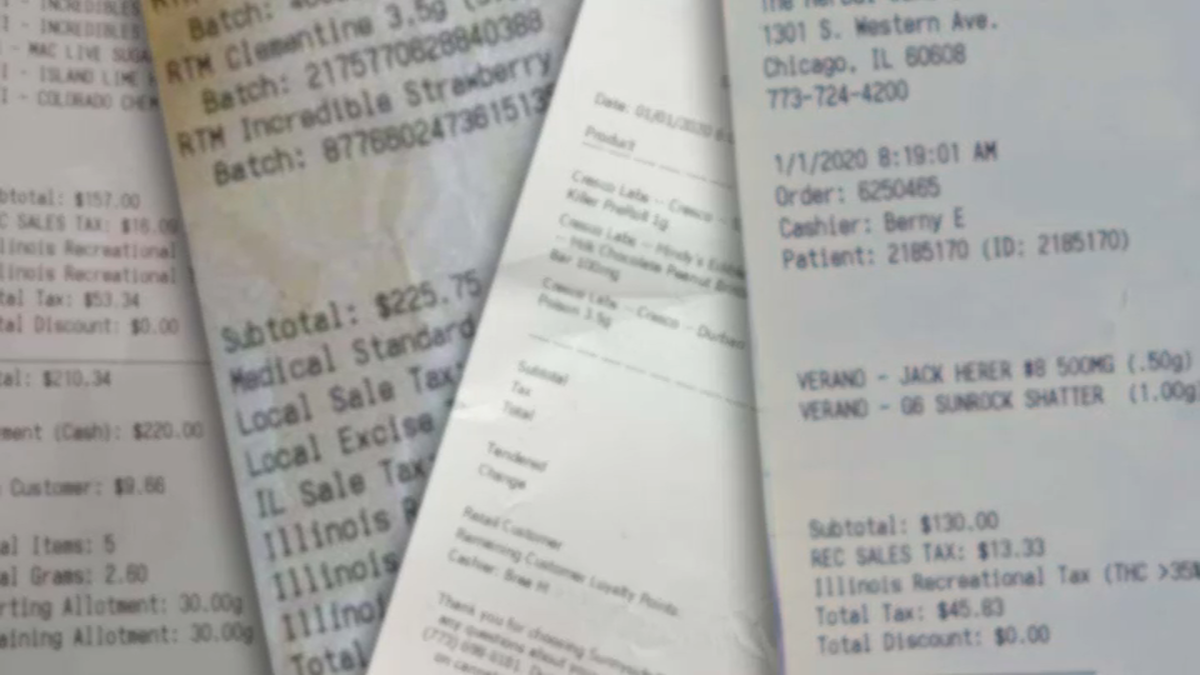
Of the 11 states where recreational marijuana has been legalized, Illinois’ taxes are second only to the state of Washington. NBC 5’s Phil Rogers took a look at the tax structure and learned about possible concerns.
Mayor Lightfoot suggested Friday she might be open to lower taxes on recreational marijuana, but that she wants to see how the program shakes out in its early months.
“The taxes are high,” Lightfoot agreed at a city hall press conference. “I think there’s plenty of opportunity if necessary to go back and make the necessary tweaks, but this is so early on that I think we just have to let things play out a little bit more and then take stock of where we are in a year’s time.”
Of the 11 states where recreational marijuana has been legalized, Illinois’ taxes are second only to the state of Washington.
“In Chicago, you are seeing in excess of 40% taxes on some sales,” said Austin Berg of the Illinois Policy Institute, which studies budget and tax issues. “Experts suggest that you want to start with really low taxes on this product, in order to get people to switch over to the legal product and then ramp up.”
Illinois didn’t do that. When state lawmakers were drafting the legislation to legalize pot, they imposed a unique three-tier tax structure. Products with THC levels below 35% are taxed at 10%; those over 35% THC are taxed at 25%; edibles draw a 20% tax.
By the time state, county and local sales taxes are figured in, high-THC pot in Chicago is taxed at 41.25%.
“The problem with that might be that it will strengthen the sale of black-market marijuana in the state,” Berg said. “When lawmakers are increasingly taxing Illinoisans more and more and more, they need to think of the unintended consequences of that.”
Local
Indeed, many shell-shocked purchasers have posted their receipts online, decrying the high Illinois taxes. One user’s receipt showed over $82 in taxes on a $220 purchase.
“You can make something so expensive that they will avoid using it,” agreed Lawrence Msall, president of the Civic Federation. “If you raise taxes so high that people no longer see the benefit of compliance, they’ll look for other alternatives.”
The state of Illinois has estimated its revenues in the first year will be around $57 million. Msall said the jury is still out on whether those numbers are realistic.
“The good news is that the state of Illinois is not relying on significant revenue from marijuana to balance its budget, fund its pensions, or do anything else,” Msall said.
The Illinois Department of Revenue said it expects to provide actual tax revenue numbers by the end of next month. In the meantime, here’s a breakdown on where the state said those tax dollars will go:
Minus administrative costs, the remaining state revenue will be allocated as follows:
- 35% for the General Revenue Fund
- 25% for the Criminal Justice Information Projects Fund to support programs to areas hard-hit by violence and disinvestment
- 20% for the Department of Human Services Community Services Fund to address substance abuse and prevention and mental health concerns
- 10% for the Budget Stabilization Fund to pay the backlog of unpaid bills
- 8% for the Local Government Distributive Fund to support crime prevention programs, training, and interdiction efforts, including detection, enforcement, and prevention efforts, relating to the illegal cannabis market and driving under the influence of cannabis
- 2% for the Drug Treatment Fund to fund public education campaign and to support data collection and analysis of the public health impacts of legalizing the recreational use of cannabis